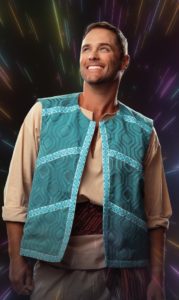IVINS — My last review for UTBA was for this exact production of Joseph and the Amazing Technicolor Dreamcoat, featuring David Archuleta as Joseph. With Archuleta’s run with the coat of many colors ending, I was intrigued to see what dynamics might shift in character, design, and more in the production. As I had stated in the review, it felt like there were parallels between young Joseph’s and young David’s with meteoric rises to stardom, as well as impactful wrestles with fame, opportunity, and faith that made a major impression on me. As part of a truly spectacularly designed and performed show, I was curious what I might notice in my second watching. In many ways, not a lot changed. Tuacahn’s production of Joseph often had a success that roared like Potipher.

The ensemble and leading roles were filled with stellar performers. In several of the Canaan sequences, there was a trio of sheep puppets that danced, reacted, and even died as dictated by the music. The puppets themselves were delightful, and the puppeteers were as hysterical to watch as the puppets themselves. Their work was a major credit to puppet director Will Gallacher and puppet designers Lisa Leilbering and James Ortiz, as well the excellent fabricators and crafters.
Similarly, I was again blown away by the performance of Katie LaMark as the narrator. She somehow manages to expand to fill the space when the story calls for it, and blend perfectly with the rest of the ensemble when her narration is less explicit. Her vocal range and bright stage presence was on the level I would expect from Kristin Chenowith and made me want to go see theater anywhere she is performing. Likewise, Neil Starkenberg playing Rueben brought an energy from the moment he stepped on stage that the show lacked until his solos in “One More Angel” kicked the show into a higher gear. Near the end of that number, he slipped in his cowboy boots, and responded to his environment like it was the most fun and natural thing in the world. It is the kind of acting that only comes from performers who truly know and love the craft.

Aside from these performers, however, the first half of act one started slowly. The production included the same costuming, choreography, and poppy version of “Any Dream Will Do” in the introduction, with the only change being Josh Strickland in the titular role. This made me second guess my earlier interpretation of the parallels between Joseph of old and Archuleta, even though Strickland has his own background in pop music and was even on American Idol. Instead, I was left wondering what the pop idol concept did for the story and whether it was unfair to ask an actor, even one as supremely gifted as Strickland, to follow up Archuleta without deviating from the production choices.
Strickland’s start was shaky, as he seemed to be uncomfortable in the role of rock star that the production demanded (in contrast to Jaylynn Steele’s dynamite portrayal of the Pharaoh), with his early performance often dominated by a zealous smile that was almost grating yet uncertain. I started out unimpressed and was ready to join his brothers, tossing him into the pit. With time, I came to find that I was overhasty in my assessment of his work, and I appreciated Strickland’s performance more. I was probably not alone in this assessment; whether because of the intense heat, sluggish act one pacing, or the doldrums of a Thursday night, the audience seemed to lack enthusiasm for the production. Even the jaw-dropping spectacle of Kara Carlson’s sky-high silk dance work did not earn major engagement from the audience.

Strickland seemed to find himself with little moments of humor, such as applauding for Carlson after her silk routine. Finally, Strickland struck a chord with an anguished and enthralling rendition of “Close Every Door” that had a soulful and technical beauty. While he and Archuletta bring different kinds of vulnerability, musicality and charm to the character, both left me with moments I will remember forever. Strickland’s command of the stage as Joseph rises to power in Egypt and his dominance of his brothers demonstrated the vigor that lay within him in this character. He juxtaposed it beautifully with an emotional embrace with Jacob when they are reunited that left me thinking, “I want that kind of hug.” It was clear that his castmates felt the same with their warm embraces of him as they left the stage.
In this viewing, I was also able to gain a greater appreciation for the live music for the production. Despite the disjointed first act, the music under the direction of Cameron Kinnear was harmonious, in sync, and able to adjust to lulls in pacing from the actors, making Andrew Lloyd Webber‘s score and Tim Rice‘s lyrics shine. And even in the sweltering summer night, individual members of the ensemble — such as Michael Carrasco (as Simeon), Samuel Gaines Jr. (as Issachar) and Kelley Dorney (as Reuben’s Wife) performed with their gusto and precision. The production of Joseph was still leagues ahead of many other productions in terms of talent, choreography, and spectacle. However, it was the first seven numbers of this show that were a famine before the rest of the show became a feast.

The crescendo of the show in both productions was the charisma, coordination and vocal supremacy of Steele as the Pharaoh. She had the swagger of Elvis and the dance moves of someone with her extensive resume and work on the “Fosse” tour. Steele is a powerhouse who brings the show to a peak of uproarious joy and excitement. She was delightfully natural and alive in the scorching center stage spotlight.
Ultimately, I walked away from my second attendance of this production moved by the chance to see two elite performers — Strickland and Archuleta — tackle a role that has deep personal meaning for me. I was wowed by spectacle that did not disappoint upon a second viewing and left me with plenty of FOMO (“fear of missing out”) for other Tuachan productions. Finally, while I think there was missed opportunity to reimagine the show in minor ways without David Archuleta, I feel that the lulls I witnessed had more to do with a hot night in the middle of a long run than anything else. Anyone can connect with the story of Joseph and Tuacahn’s production, and if you’re lucky, “it could be you.”
[box]Joseph and the Amazing Technicolor Dreamcoat plays various dates and times through October 20 at the Tuacahn Amphitheater (1100 Tuacahn Drive, Ivins). Tickets are $32-108. For more information, visit taucahn.org.[/box]

